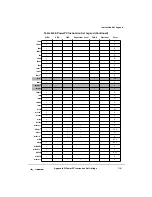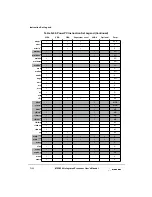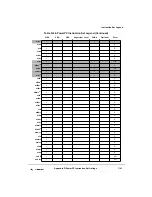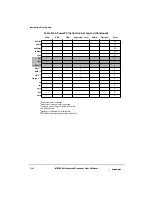
Appendix E. Processor Core Register Summary
E-11
PowerPC Register Set
The comparison and loop are necessary to ensure that a consistent pair of values has been
obtained. The previous example will also work on 64-bit implementations running in either
64-bit or 32-bit mode.
E.1.2.2 Computing Time of Day from the Time Base
Because the update frequency of the time base is system-dependent, the algorithm for
converting the current value in the time base to time of day is also system-dependent.
In a system in which the update frequency of the time base may change over time, it is not
possible to convert an isolated time base value into time of day. Instead, a time base value
has meaning only with respect to the current update frequency and the time of day that the
update frequency was last changed. Each time the update frequency changes, either the
system software is notified of the change via an exception, or else the change was instigated
by the system software itself. At each such change, the system software must compute the
current time of day using the old update frequency, compute a new value of
ticks-per-second for the new frequency, and save the time of day, time base value, and tick
rate. Subsequent calls to compute time of day use the current time base value and the saved
data.
A generalized service to compute time of day could take the following as input:
•
Time of day at beginning of current epoch
•
Time base value at beginning of current epoch
•
Time base update frequency
•
Time base value for which time of day is desired
For a PowerPC system in which the time base update frequency does not vary, the first three
inputs would be constant.
E.1.3 PowerPC OEA Register Set
The PowerPC operating environment architecture (OEA) comprises the remaining
PowerPC registers. The OEA defines the registers that are used typically by an operating
system for such operations as memory management, configuration, and exception
handling. Figure E-1 shows a graphic representation of the entire PowerPC register
set—UISA, VEA, and OEA implemented on the MPC8240.
All of the registers in the OEA, including the SPRs, can be accessed only by
supervisor-level instructions; any attempt to access supervisor SPRs with user-level
instructions results in a supervisor-level exception. Some SPRs are
implementation-specific.
Note that the GPRs, LR, CTR, TBL, MSR, DAR, SDR1, SRR0, SRR1, and
SPRG0–SPRG3 are 32 bits wide on 32-bit implementations (like the MPC8240).
A summary of the PowerPC OEA supervisor-level registers in the MPC8240 follows:
Summary of Contents for MPC8240
Page 1: ...MPC8240UM D Rev 1 1 2001 MPC8240 Integrated Processor User s Manual ...
Page 38: ...xviii MPC8240 Integrated Processor User s Manual TABLES Table Number Title Page Number ...
Page 48: ...xlviii MPC8240 Integrated Processor User s Manual Acronyms and Abbreviations ...
Page 312: ...6 94 MPC8240 Integrated Processor User s Manual ROM Flash Interface Operation ...
Page 348: ...7 36 MPC8240 Integrated Processor User s Manual PCI Host and Agent Modes ...
Page 372: ...8 24 MPC8240 Integrated Processor User s Manual DMA Register Descriptions ...
Page 394: ...9 22 MPC8240 Integrated Processor User s Manual I2O Interface ...
Page 412: ...10 18 MPC8240 Integrated Processor User s Manual Programming Guidelines ...
Page 454: ...12 14 MPC8240 Integrated Processor User s Manual Internal Arbitration ...
Page 466: ...13 12 MPC8240 Integrated Processor User s Manual Exception Latencies ...
Page 516: ...16 14 Watchpoint Trigger Applications ...
Page 538: ...B 16 MPC8240 Integrated Processor User s Manual Setting the Endian Mode of Operation ...
Page 546: ...C 8 MPC8240 Integrated Processor User s Manual ...
Page 640: ...INDEX Index 16 MPC8240 Integrated Processor User s Manual ...
















































